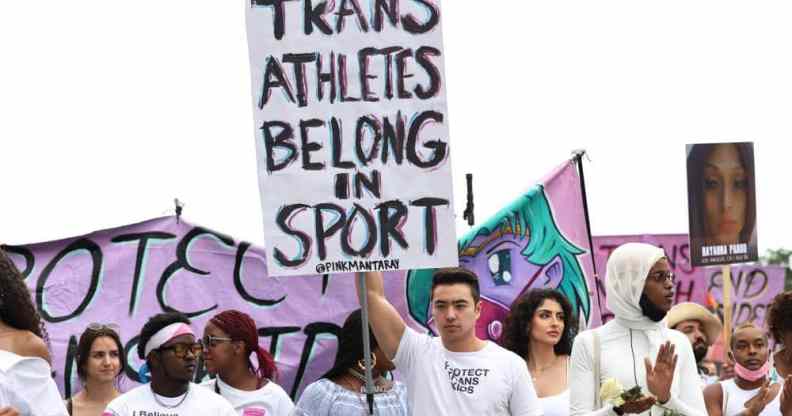Kentucky Republicans override governor’s veto to force through trans sports ban

A person holds up a sign that reads “Trans athletes belong in sports” during a demonstration. (Getty/Michael M Santiago)
Kentucky Republicans have overturned the Democratic governor’s veto in order to force through a ban on trans kids playing sports in schools.
Governor Andy Beshear vetoed Senate Bill 83 (SB 83) last week, as he argued it “discriminates against transgender children” and “most likely” violates the constitutional right to “equal protections”.
But on Wednesday (13 April), Kentucky’s GOP-controlled state legislature voted to override Beshear’s veto and enact the legislation. The state’s Senate voted 29-8 and the House voted 72-43 to bypass the governor.
As such, SB 83 has now been rendered into law and takes effect immediately, NBC News reported.
The new law bans trans students in grades six through 12 from participating in athletic activities or sports designated for girls. However, the legislation doesn’t prohibit students from participating in sports designated for “boys” or as “coed”.
Activists have said there is only one openly trans girl playing sports in the entire state school system.
The Fairness Campaign executive director Chris Hartman said the young girl will now be stopped from “playing with her friends” in her eighth grade year as a result of the new law.
“This bill has been so plainly about political gain and using Kentucky kids as political pawns that it is an embarrassment to our commonwealth,” Hartman said.
“Instead of solving any of Kentucky’s real problems, the politicians behind this bill used their power to bully this one student and take away rights from kids who just want to play games with friends.”
The law will also prevent schools, athletic organisations or any school members from entertaining a complaint, opening an investigation or taking “any other adverse action against a school for maintaining separate interscholastic or intramural athletic teams, activities or sports” for girls.
LGBT+ advocates slam Kentucky Republicans for attacking trans youth
Cathryn Oakley, state legislative director and senior counsel at the Human Rights Campaign, denounced the Kentucky General Assembly for choosing to “politicise” trans kids, “isolate them” and “prevent them from being included”.
Oakley added the new law purposefully marginalises the trans community without addressing the “actual challenges facing girls’ and women’s sports programmes, like chronic underfunding”.
“Kentucky’s legislators should never forget that they are culpable for the harm that they are causing to children, who must now bear the weight of even more discrimination,” Oakley said.
Hartman shamed lawmakers for “attacking trans kids” and for passing the state’s “first explicitly anti-LGBTQ law” in the state in “almost a decade”.
He warned the new law “makes clear” that the rights of trans people in Kentucky “are in danger” and vowed to fight to ensure “equal rights for everyone” are protected in Kentucky.
“We look forward to the lawsuit that’s sure to come,” Hartman said. “If we can’t protect Kentucky’s trans kids in our legislature, we’ll protect them in our courts.”
ACLU of Kentucky spokesperson Samuel Crankshaw reminded lawmakers that trans and non-binary people in the state “still have rights and are protected from discrimination” under the US Constitution as well as other federal and state laws.
As such, Crankshaw said schools and athletic organisations should take care to follow these laws and not stop trans students from “participating fully in school activities”.
“This bill is a solution in search of a non-existent problem that is rooted in hate and unconstitutional,” Crankshaw added. “By enacting SB83, lawmakers are jeopardising our children’s mental health, physical well-being, and ability to access educational opportunities comparable to their peers.”
The debate over the inclusion of trans athletes has become a political flashpoint in the US, particularly among Republicans.
In this year alone, Republicans in Iowa, South Dakota, Oklahoma, Arizona and Utah have enacted trans sports bans.
Republican governor Eric Holcomb vetoed an anti-trans sports ban that landed on his desk in March, but conservatives could overturn this when the state legislature meets next month.
Last year, LGBT+ advocates watched in horror as similar bans were passed into law in Arkansas, Alabama, Florida, Mississippi, Montana, Tennessee, Texas and West Virginia.

